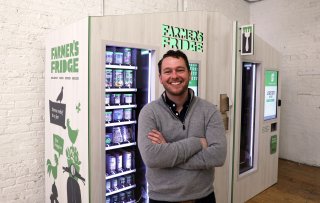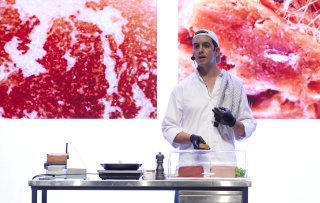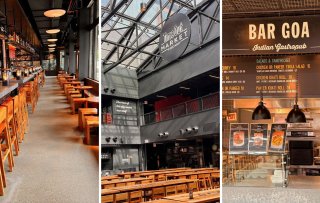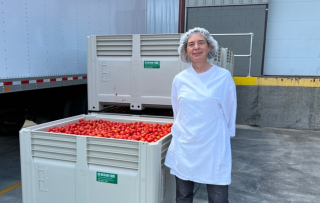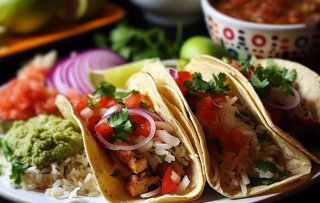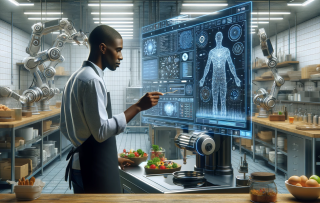How can we feed and nourish 10 billion people by 2050 in sustainable, inclusive, efficient, nutritious, and healthy ways? Part of this challenge lies in shifting diets toward more balanced and plant-forward options. Greg Drescher, Senior Advisor at The Culinary Institute of America, is an industry expert on this topic. He shares his vision on what’s needed to create a more sustainable food system and shift towards more plant-forward diets.
A better food system starts with a vision. In his podcast series Food Lab Talk, Michiel Bakker, Google's Vice President of Workplace Strategy, Innovation and Sustainability, interviews inspiring change makers at the forefront of pressing food system challenges. Each month, Food Inspiration highlights one of these visionaries. The second season of Food Lab Talk focuses on shifting diets, and features Greg Drescher, Senior Advisor and former Vice President for Strategic Initiatives and Industry Leadership, from The Culinary Institute of America. For almost 30 years, he and his team have designed and launched a portfolio of industry leadership programs, including The Worlds of Flavor International Conference and Festival, and The Menus of Change - National Leadership Summit.
From your perspective, what is the current state of our food system?
"Many change makers rightly argue for a major food system transformation, oftentimes characterizing our current food system as broken. I view it slightly differently. I believe the food system has over-delivered on its initial promises to create efficiency and make food more accessible to all. However, in our efforts to 'fix' our current food system, we cannot afford to lose the efficiency that exists within it. Feeding the existing population in a healthful, sustainable manner is challenging enough. But to feed 9 to 10 billion people by 2050 within planetary boundaries, we need efficient and sustainable food production systems more than ever."
How can we make our food system more sustainable?
"The EAT Lancet report focuses on this transformation. A team of scientists and experts sought to answer how we can feed the growing world population in a way that provides optimal diets and nutritional value while staying within planetary boundaries, including climate change, biodiversity, and land use issues. The conclusion is what we at The Culinary Institute of America call a plant-forward dietary pattern. This shift from a diet overly dependent on animal sources to one more reliant on plant sources is crucial. Chefs play a key role here. In recent decades, especially in the United States and Northern Europe, we've relied too heavily on foods from animal sources. The expertise of chefs and other culinary professionals working in these regions often lies in building flavor around animal proteins, and we're not as skilled in cooking vegetables and preparing whole grains or pulses. The opportunity lies in the same creativity chefs tap into to create indulgent foods for special occasions, but now focusing on delicious everyday plant-forward cooking, whether in restaurants or at home."

Are culinary students today different to those 20 ago in terms of their aspirations?
"Today's culinary students are indeed different, as the internet has expanded their horizons. They cannot escape the news about climate change or deny the alarming statistics about chronic disease rates. So, there is an increased awareness of these concerns. Yet, many still come to the CIA with dreams of opening the next great American restaurant, a fancy bakery or inventing the next brilliant food product."
"What has also changed is that the career paths of our students have diversified significantly. Many now pursue roles outside of traditional chef positions, working for major companies, some even outside the food industry. We launched a master's degree in Sustainable Food Systems last year, which has garnered significant attention. If you'd told me 20 years ago that this was the future of the CIA, I would have been skeptical. But this shift signifies the CIA's long-term evolution into a food-centered university offering multiple pathways for student engagement and scholarship."
Chefs significantly influence our food choices and diets. What is your theory of change regarding diet shifts?
"Deliciousness is key to encouraging diet shifts. The healthier or better food alternative must at least be as appealing as current choices. The public health community and food industry must prioritize making healthy food not just tasty but absolutely craveable. Chefs are pivotal in creating these delicious, healthier options. They should be involved early in the menu development process, especially in large organizations, to rethink flavors and build desire for plant-forward dishes. We can't entirely legislate dietary changes, so building desire through chefs' creativity is essential."
"If you're talking about stimulating healthier food offerings in schools, hospitals, corporate cafeterias or restaurants, we need more working models to serve as best practices for chefs and professionals, where they can walk in, experience the food offering and say, “OK, I get it, this is good, how can we scale this?” Until now, within the food space we haven't done enough of that."
“Deliciousness is key to encouraging diet shifts. The healthier or better food alternative must at least be as appealing as current choices.”
"We're not going to be successful in shifting diets just by telling people that they need to do this. We need to create more food experiences that consumers can just walk into and where they don't have to think if what they put on their plates is healthy or sustainable. Everything they choose is equally delicious, and by the way it also happens to be plant-forward. There’s people that specialize in food choice architecture. We did a collaborative project with Stanford University some years ago, working with them to design a new food hall where you can walk in and you're immediately hit by all kinds of delicious plant-forward dishes, some vegetarian, some vegan, but all rich in plants. They didn't take out the meat completely. But it was tucked away at the end of the hall. By the time you got there, chances are your plate is full. It's been an overwhelming success."
"We’re looking at the future of our food system with a focus on business opportunities. Because if you can't make money doing this, it’ll be hard to get the industry to shift."
Next to your role at the CIA, you have a broader reach, with a platform like the Menus of Change Summit. How does this help to create an impact?
"We have a long-running partnership with the Harvard School of Public Health, organizing events with the top nutrition researchers, primary care physicians, and healthcare leaders. For many years we focused mainly on health. Going back about 12 years ago, we said, let's reframe the scope for a parallel initiative, and make it more holistic and futureproof. And so the tagline for this new Menus of Change conference series became “the business of healthy, sustainable, delicious food choices.” We’re now looking at what could be the future of our industry, with health and sustainability on an equal footing, but all wrapped up in a package of business opportunity and strategy. Because if you can't make money doing this, it’ll be hard to get the industry to shift."
"We started off by creating 24 principles of healthy and sustainable menus, some of which are about operational practices, some of which are about sourcing ingredients and designing menus. And that's been hugely helpful to the industry. But we also bring in experts to give us a deep dive on biodiversity, on the use of antibiotics, on aquaculture, and many other topics. We don't necessarily want to turn chefs into experts in all of those areas, but we do believe it's important for chefs to become familiar enough so they can be part of the conversation, know what questions to ask, and know where to go for additional expertise."
"The Summit has inspired our Menus of Change University Research Collaborative, which is a partnership with Stanford University. With this collaborative, we set out to look at the whole college and university sector to serve as an accelerator and living lab. Here you have young people that are open to experimentation, you have the real-life practices of food service operations, but in the controlled environment of a university. Not a restaurant where people are coming in on a Friday night for a special celebration or a high-traffic outlet on an airport where people want to be served in less than 90 seconds. We have about 70 institutions partnering in our collaborative, and we're doing multi-site research across different universities to try out promising innovations in a pre-competitive space. I think it’s these kinds of initiatives that help move the needle forward."
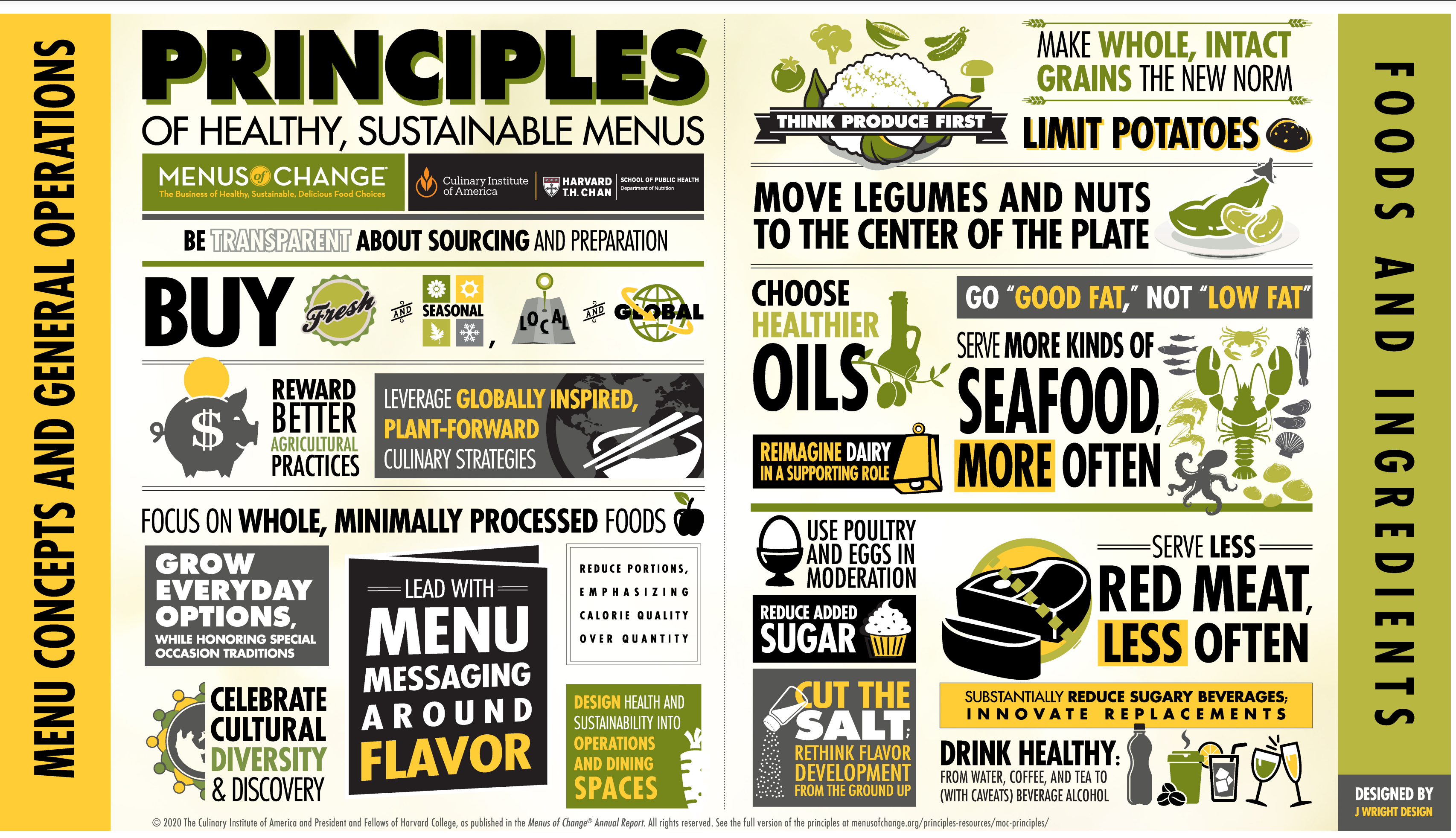
.jpg-28x28.jpg) Written by
Written by 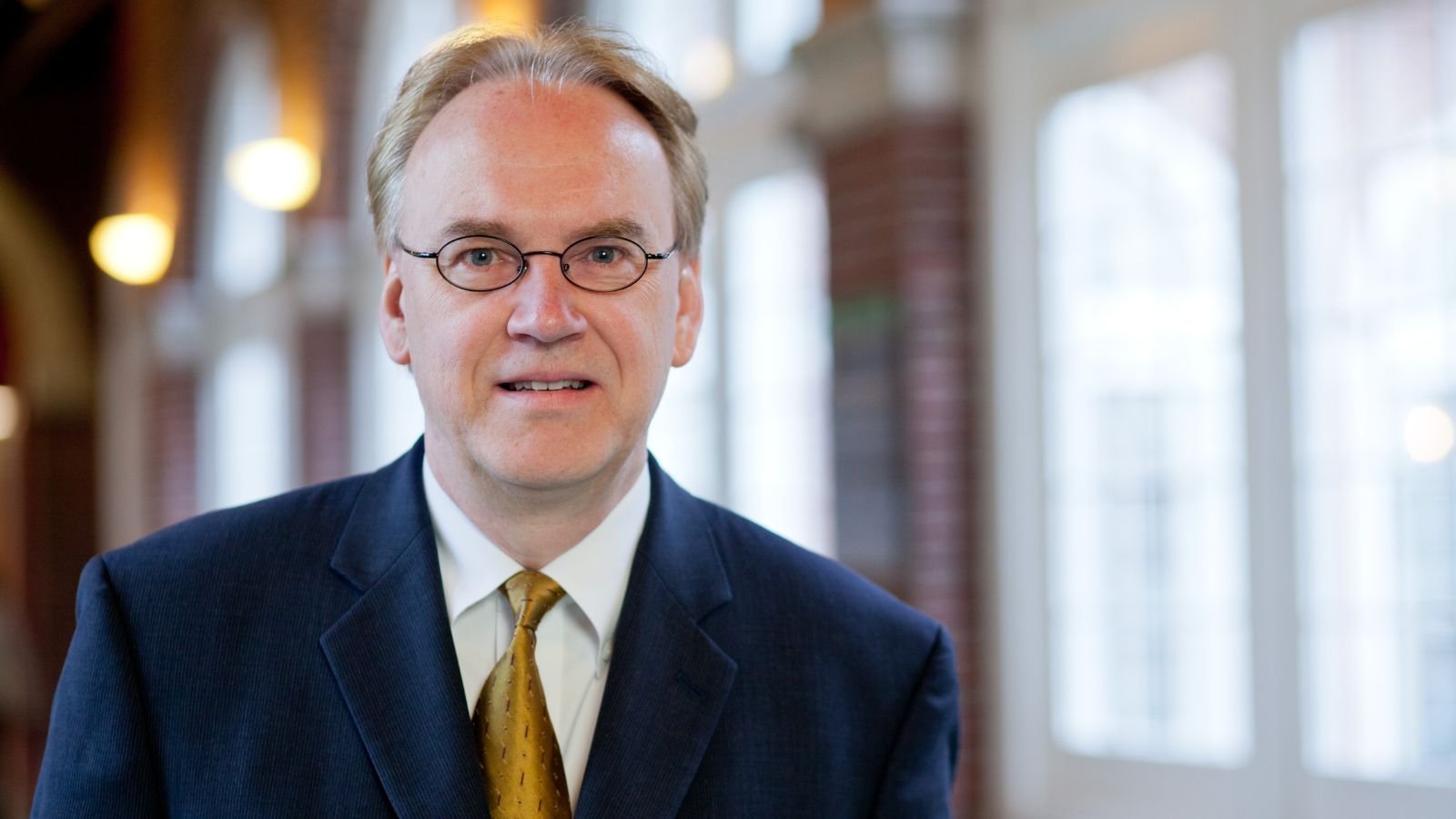
.jpg-300x300.jpg)
.jpg-50x50.jpg)













